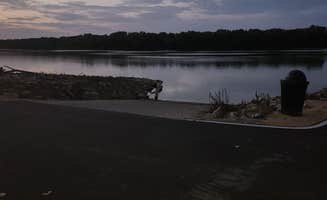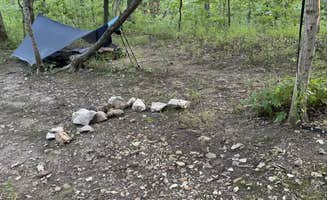Dispersed camping near Clarksville, Missouri offers primitive riverside experiences along the Mississippi River floodplain at elevations around 500 feet above sea level. The area experiences four distinct seasons with hot, humid summers and moderately cold winters. Most dispersed sites in this region are situated on gravel bars or cleared areas that require campers to be completely self-sufficient with supplies.
What to do
Barge watching: At Silo Access Area - O'Neil Creek, campers can observe commercial river traffic. "You sit and watch the barges and various things float by. Really great," notes one visitor. The riverside location provides unobstructed views of Mississippi River navigation.
Fishing access: The boat ramp at Silo Access Area - O'Neil Creek allows anglers to launch directly onto the Mississippi. "There is a large boat ramp," confirms one reviewer, though conditions may vary seasonally as "the boat ramp was a bit of a mess with logs and sandbars" during certain periods.
Short drives to amenities: Despite the remote feel, Clarksville's dispersed camping areas remain close to civilization. "Hidden Gem! No facilities, short drive into town," explains a camper about their experience at Silo Access Area.
What campers like
Riverfront positioning: The direct access to the Mississippi River ranks highly among campers at Lone Spring Trail Backpacking Campsite(s). "The site has several areas to setup a tent has a metal fire pit. I will be going back next year," shares one backpacker who appreciated the riverside tent spots.
Cost-free camping: The absence of fees at dispersed sites near Clarksville attracts budget-conscious outdoor enthusiasts. "Can beat free and great views," mentions one reviewer about their stay at Silo Access Area.
Recently improved infrastructure: Some dispersed areas have received maintenance upgrades. "The area is freshly paved and undergoing reforestation. However, there are a lot of trees," notes a camper about recent improvements at Silo Access Area.
What you should know
Limited designated spaces: Despite being dispersed, camping areas have informal site boundaries. "There are 13 sites for RVs and Travel Trailers. Three sites are curved to pull in and out easily. Site 13 is large enough for 2 RVs," explains a camper at Ranacker Conservation Area.
Railroad proximity: Train tracks run parallel to the Mississippi River near most dispersed camping areas. "You are close to the RR tracks but there aren't that many trains," mentions one camper, while another advises to "bring your earplugs" due to periodic train noise.
Insect considerations: Riverside camping comes with natural challenges. "Mosquitoes are prevalent," warns one reviewer about conditions at Silo Access Area, particularly during warm months when standing water may accumulate.
Tips for camping with families
Site selection strategy: When camping with children near the Mississippi, choose sites away from steep riverbanks. "Primitive camping on the Mississippi River. This is mostly a wide gravel bar that you can set up camp on with great views of the big river," explains a camper about the terrain at Silo Access Area - O'Neil Creek.
Educational opportunities: The Mississippi River provides learning experiences about river ecosystems, commercial shipping, and water safety. Bring binoculars for wildlife viewing as diverse bird species frequent the area.
Weather preparedness: River valleys experience rapid weather changes that affect camping conditions. Pack additional clothing layers and shelter reinforcements, particularly during spring when river levels fluctuate most dramatically.
Tips from RVers
Self-containment necessity: RVers must bring everything needed for their stay. "No water, no electrical hookups, and no bathrooms. There is 1 small trash bin," confirms a reviewer at Lone Spring Trail Backpacking Campsite(s).
Surface considerations: Most dispersed sites near Clarksville feature gravel surfaces. "Nice campground with a great view of the Mississippi... bring your rv, water and a generator," advises one camper about the terrain and necessities.
Leveling challenges: The natural terrain may require additional leveling equipment. Riverfront sites often have subtle grades toward the water that affect RV positioning.



